ACT EXAM PREP
The first step to admission at
|
|
You know what score you need to apply to your dream school. Achievable is the only prep course for the ACT® test that uses memory science-enhanced practice to ensure you reach your goal.
100% money back guarantee
Peek inside
ACT® is a registered trademark belonging to ACT Education Corp. ("ACT"). ACT is not involved with or affiliated with Achievable, nor does ACT endorse or sponsor any of the products or services offered by Achievable.
You'll love studying with Achievable
Thousands of students trust Achievable exam prep to help them pass their most important exams
95%+
Success rate
50M+
Questions answered
2M+
Hours studied
Very simple to grasp concepts with well laid out formatting. Definitely makes getting through topics easy and efficient.
Achievable is the best resource I've found. More so than with [competitor], or [competitor] I find the material "sticks" with Achievable's system of introducing new material, followed by review quizzes to master previous readings. It's incredibly easy to use, anywhere you are (at home on a desktop, laptop, or away with your mobile device) and actually interesting to read. Every other guide I've tried reads like stereo instructions.
This website is intuitive, clear, and comprehensive as it walks you through some of the more difficult terminologies along with proper explanations for them.
Been studying for this for a week and this helped me more than the 300-page textbook I read. Thank you. I've been studying for these exams for almost 6 months and have been SO confused. Now I understand! Wow! you made it so clear! Thank you so much!
This is great. It has everything I need and everything is so intuitive and helpful it's just so so so so great.
I am pleasantly surprised at the quantity and quality of information supplied by achievable. I was skeptical at first, but after spending time with them I i highly recommend using them. If you are looking for more detailed information I would suggest looking somewhere else, but honestly all you need are the basics.
The platform is very intuitive and have comprehensive options for preparation.
I sit very soon for the exam and loved it! The material is much better to follow than any other program I've tried!
Endless math practice
Continually reviewing the material you've learned while studying is essential, but you need more than simple ACT math flashcards. Study with an endless amount of ACT math practice exam questions. Unlike other ACT prep courses, we don't have a fixed-size bank of ACT math practice questions. Our system generates millions of unique quiz questions with randomized text and variables from 250+ ACT math question templates, ensuring you're learning the core concepts instead of simply recalling answers. After answering a question, you can review a step-by-step walkthrough of the math, formulas, and logic involved.
Comprehensive English
With our high-quality, hand-crafted ACT English questions, you get a comprehensive overview of how to master the ACT English section. Our ACT English questions include all of the types of questions that you'll see on the exam: Usage/Mechanics (punctuation, grammar and usage, sentence structure) and Rhetorical Skills (writing strategy, organization, style).
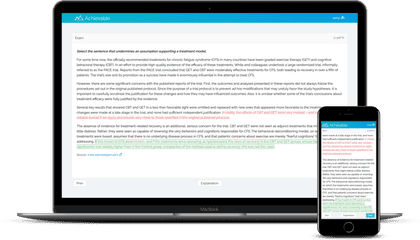
Smart Reading
The ACT Reading section is different from reading comprehension tests you've taken in school. Our thoughtful, expert-written ACT Reading practice questions will teach you the tips and insights you need to get a top score. We teach you how to approach each of the four passages - prose fiction, social science, humanities, and natural science - with specific strategies for each.
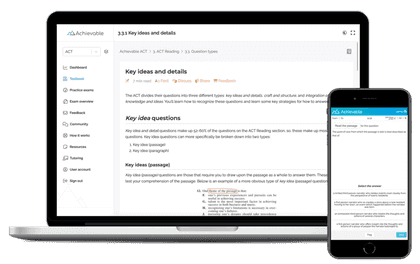
Sound Science
The ACT Science section isn't testing you on your science knowledge - it's testing you on your ability to deduce the necessary information from a chart, table, or passage and then use that information to answer questions. Our logic-based and data-rich ACT Science practice questions closely mirror what you'll see on the real ACT to help you master the concepts needed to get a top score.
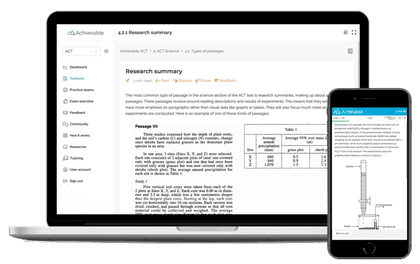
Modern platform
Whether you're studying on the web or a smartphone, the Achievable ACT exam prep platform UX is clean and responsive. Progress charts highlight your journey through the ACT course content and your current strength in each section.
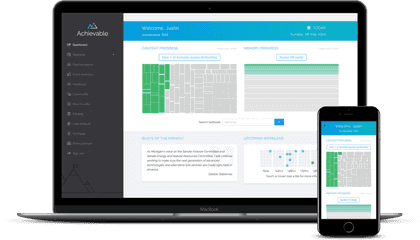
Easy-to-understand online textbook
Learn how to answer hard ACT questions in less time using proven strategies and pro tips from our expert author team with 10+ years of experience. Achievable's ACT course is easy to understand, mobile friendly, and includes detailed walkthroughs of practice questions. Achievable is the easiest way to learn the ACT math and English sections.
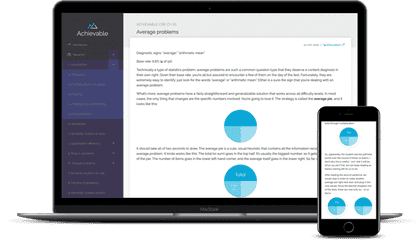
Advanced personalization
Achievable ACT exam prep uses adaptive learning techniques to create and update a personalized model of your memory, individually tracking your retention and mastery of each ACT exam learning objective. Our learning engine monitors your study progress and continually adjusts your quiz questions to ensure you're focusing on the topics that matter most for you, improving study effectiveness while reducing overall study time.
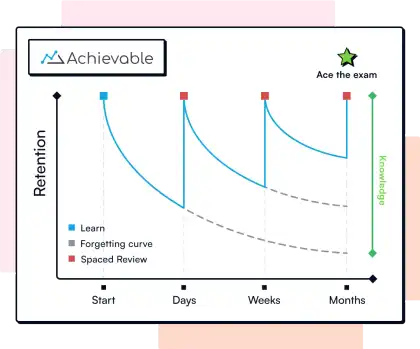
Proven success
With Achievable, you will reach your target score. The effectiveness of our courses is empirically validated with 2,000,000+ hours studied and 50,000,000+ quiz questions answered.
We stand behind the quality of our materials with the best score improvement guarantees in the industry.
+6
for "before" scores < 20+5
for "before" scores < 25+4
for "before" scores < 30Improve your score, or your money back
It's that simple. No study time requirements or study progress thresholds are needed to qualify.
Why take the ACT?
The ACT test is a nationally recognized college admissions test, just like the SAT exam. And like the SAT, it is accepted by all four-year colleges and universities in the US. The ACT is good value because, in addition to being a college admissions test, it also can count for college course placement, increase your chances of getting scholarships, and even includes a career planning section. Furthermore, while the SAT has undergone significant changes over the last few years, the ACT has remained the same. The ACT is the nation's most-taken college entrance test, and is based on what you already learned in school.
Is the ACT or SAT more difficult?
In terms of the tests themselves, the ACT and SAT are similar in difficulty. But in terms of what score you need to get into good schools, the ACT has less competition. You need an ACT score in the top 3% to have a good shot of being admitted to Harvard or Yale, but that's actually more generous than the SAT, where you need a top 2% score for the same universities.
Do colleges prefer the SAT or ACT?
The vast majority of colleges accept scores from either test. If they accept scores from both tests, they must evaluate them equally - this is required by law.
How hard is the ACT?
The ACT is a medium-difficulty exam, meant to be challenging for everyone but approachable to anyone - including people that do not have a traditional public school education. It has five sections: English, Math, Reading, Science, and an optional Writing section. Be sure to check whether the colleges you're applying for require or recommend the writing section.
It is expected that experienced students can study for about 100 hours and achieve a top score, while those who are just learning the material for the first time should expect to spend 150+ hours to be suitably prepared.
The ACT tests five major skills:
Problem solving
You will be expected to use logic and the evidence presented to deduce the correct answer from multiple choices. This isn't too different from what you've already done in school – the difference is the subject matter and remembering which rules or calculations apply.
Mathematics
The ACT has math – there's no way around it. Fortunately, the math in the ACT is straightforward and more a matter of how you apply it rather than doing complex calculations. It's the standard PEDMAS: parentheses, exponents, multiplication, division, addition, and subtraction.
The English language
You need a strong mastery of the English language in order to score well on the ACT. This includes grammar, vocabulary, and writing. However, you don't have to know every grammatical rule, and the rules you do need to know are easy to memorize.
Data interpretation
The ACT Science test quizzes students on their ability to interpret scientific data. Throughout the test, students must scan tables, charts, and short research summaries and answer questions based on the data presented.
Memorization
It's maybe not everyone's favorite part of the test, but you will need to memorize some key formulas. Achievable has adaptive, memory-tracked quizzes built into our course to ensure you'll remember all the material you've learned on test day.
ACT exam details
The ACT® is a standardized test used for undergraduate college admissions in the United States. It is created and administered by American College Testing (ACT), a for-profit corporation of the same name.
The ACT exam is hosted by ACT and costs $63 (+$15 for writing) to register. Participants have 3 hours 35 minutes to answer 215 multiple-choice questions and 1 essay.
American College Testing's ACT exam summary
ACT english test
45 minutes
75 questions
The ACT english test asks you to edit English language texts. You will need to be able to assess passages on a wide variety of topics and rhetorical situations.
ACT mathematics test
60 minutes
60 questions
The ACT mathematics test gauges your ability to do math typically taken by American students through grade 11. This includes geometry, statistics & probability, modeling, algebra, functions, number & quantity, integration of essential skills, and a small number of trigonometry questions. It assumes you have knowledge of basic formulas and basic computational skills.
ACT reading test
35 minutes
40 questions
The ACT reading test evaluates your ability to make logical decisions about long texts using the information they contain. You must be able to determine main ideas, identify significant details, make comparisons, find and interpret significant details, determine the meaning of context-dependent words, evaluate claims and evidence in arguments, and bring together information from up to four passages.
ACT science test
35 minutes
40 questions
The ACT science test measures the core skills required by the natural sciences: interpretation, analysis, evaluation, reasoning, and problem solving. The science test includes content related to biology, chemistry, physics, geology, astronomy, and meteorology. You are asked to digest the information provided, critically evaluate that information relative to the hypotheses provided, and draw conclusions or make predictions.
ACT writing test (optional)
40 minutes
Prompted essay
The ACT writing test is an optional essay test that measures the writing skills typically taught to American students through grade 11. You are given one writing prompt that describes a complex issue, and then given three different perspectives on that issue. You must read the prompt and perspectives before developing your own perspective. You must relate your perspective to one or more of the provided perspectives. Your perspective may support one of the perspectives provided, or it can introduce a new perspective that is completely different.
Achievable ACT content outline
1
ACT Math
You will need a mastery of all math typically taught in American high schools through grade 11 in order to score well on the ACT. We cover each of the core topics in detail: pre-algebra; elementary algebra, intermediate algebra, geometry, coordinate geometry, and trigonometry.
2
ACT English
You must show mastery of the English language to get a great ACT score. This doesn't just mean knowing English at a high school level - it also means correctly following all of the technical rules of English writing. We cover all of these rules and structures in detail: punctuation; conventions of usage; knowledge of language; organization, unity, and cohesion; sentence structure; and topic development.
3
ACT Reading
To succeed in the ACT Reading section, mastering high-level reading comprehension is crucial. Key skills such as identifying main ideas, understanding the author's intent, and making predictions will be honed. Emphasis will be placed on learning effective annotation techniques, managing time efficiently, understanding various question types, and avoiding common test pitfalls.
4
ACT Science
Scoring well in the ACT Science section involves prioritizing the interpretation and analysis of scientific data over rote memorization. Focus on refining your reading and data interpretation skills. You'll also familiarize yourself with effective science focused test-taking strategies and learn to navigate various types of science passages and questions on the ACT Science Section.
ACT resources
Achievable has you covered for the ACT. Check out our Shift podcast to help you prepare for the ACT exam or for a quick refresher on college admissions and the ACT fundamentals.
Achievable ACT - $129
Get ACT test prep built for today's learners - mobile, guided, and personalized. Reach your target ACT score with our powerful online self-study course and practice questions for math, English, science, reading, and writing.
Easy-to-understand online textbook
Chapter quizzes
Practice exams

Learn from the best

Achievable's ACT course content was written by Marc Gray, founder of Odyssey College Prep. Marc has made it his life's mission to make the college admissions process more accessible to students and parents. At Odyssey, Marc has helped hundreds of students increase their ACT score by an average of 4+ points. He is supported by the Odyssey College Prep team, which has decades of combined experience in preparing students for the ACT exam.

Hit your target score
Achievable is the best online ACT exam prep course: effective, personalized, and convenient. With Achievable, you'll spend less time studying and hit your target score with confidence.
